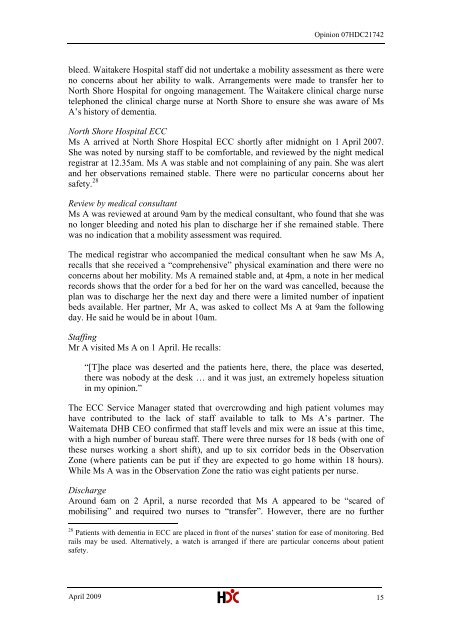North Shore Hospital report - New Zealand Doctor
North Shore Hospital report - New Zealand Doctor
North Shore Hospital report - New Zealand Doctor
You also want an ePaper? Increase the reach of your titles
YUMPU automatically turns print PDFs into web optimized ePapers that Google loves.
Opinion 07HDC21742bleed. Waitakere <strong>Hospital</strong> staff did not undertake a mobility assessment as there wereno concerns about her ability to walk. Arrangements were made to transfer her to<strong>North</strong> <strong>Shore</strong> <strong>Hospital</strong> for ongoing management. The Waitakere clinical charge nursetelephoned the clinical charge nurse at <strong>North</strong> <strong>Shore</strong> to ensure she was aware of MsA‘s history of dementia.<strong>North</strong> <strong>Shore</strong> <strong>Hospital</strong> ECCMs A arrived at <strong>North</strong> <strong>Shore</strong> <strong>Hospital</strong> ECC shortly after midnight on 1 April 2007.She was noted by nursing staff to be comfortable, and reviewed by the night medicalregistrar at 12.35am. Ms A was stable and not complaining of any pain. She was alertand her observations remained stable. There were no particular concerns about hersafety. 28Review by medical consultantMs A was reviewed at around 9am by the medical consultant, who found that she wasno longer bleeding and noted his plan to discharge her if she remained stable. Therewas no indication that a mobility assessment was required.The medical registrar who accompanied the medical consultant when he saw Ms A,recalls that she received a ―comprehensive‖ physical examination and there were noconcerns about her mobility. Ms A remained stable and, at 4pm, a note in her medicalrecords shows that the order for a bed for her on the ward was cancelled, because theplan was to discharge her the next day and there were a limited number of inpatientbeds available. Her partner, Mr A, was asked to collect Ms A at 9am the followingday. He said he would be in about 10am.StaffingMr A visited Ms A on 1 April. He recalls:―[T]he place was deserted and the patients here, there, the place was deserted,there was nobody at the desk … and it was just, an extremely hopeless situationin my opinion.‖The ECC Service Manager stated that overcrowding and high patient volumes mayhave contributed to the lack of staff available to talk to Ms A‘s partner. TheWaitemata DHB CEO confirmed that staff levels and mix were an issue at this time,with a high number of bureau staff. There were three nurses for 18 beds (with one ofthese nurses working a short shift), and up to six corridor beds in the ObservationZone (where patients can be put if they are expected to go home within 18 hours).While Ms A was in the Observation Zone the ratio was eight patients per nurse.DischargeAround 6am on 2 April, a nurse recorded that Ms A appeared to be ―scared ofmobilising‖ and required two nurses to ―transfer‖. However, there are no further28 Patients with dementia in ECC are placed in front of the nurses‘ station for ease of monitoring. Bedrails may be used. Alternatively, a watch is arranged if there are particular concerns about patientsafety.April 2009 15
















